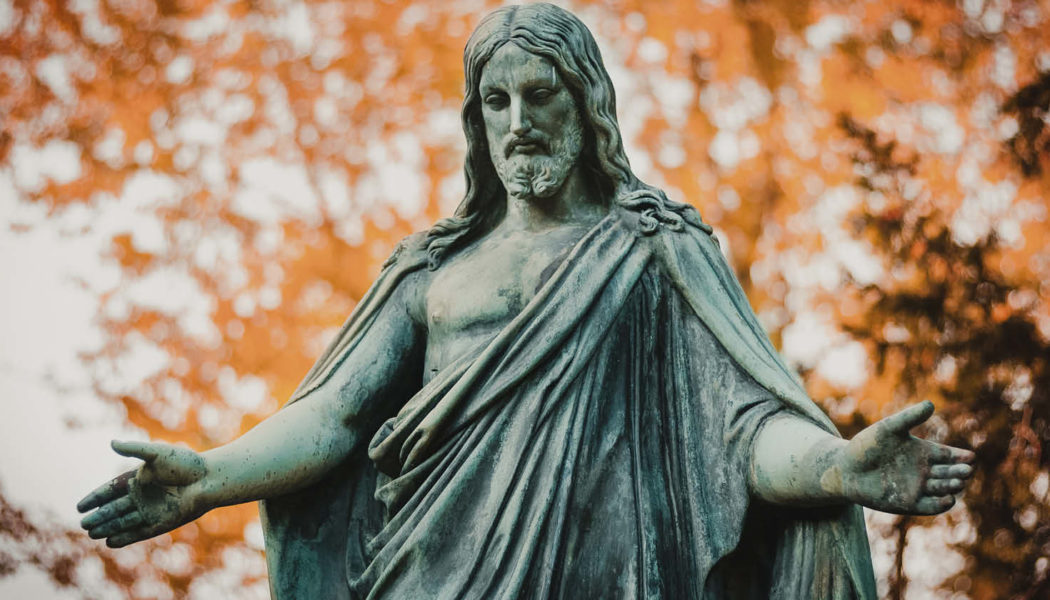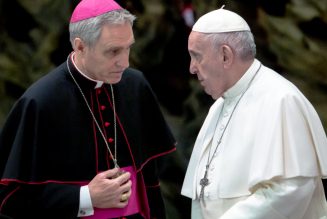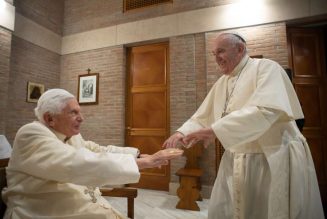
Jesus masterfully diagnoses what makes our society sick in the Gospel this Sunday, the 31st Sunday of Ordinary Time, Year B, and what we can do about it.
In brief, Jesus says to aim our life at its highest possible end, and not to allow anyone to push or cajole us away from that aim, but to bring them along with us instead if at all possible.
A scribe asks Jesus to identify the most important commandment, and in response, Jesus does that and more.
Jesus tells him not just that the first commandment is, “You shall love the Lord your God with all your heart, with all your soul, with all your mind, and with all your strength,” but that there is a second: “You shall love your neighbor as yourself.”
He puts them both on a level with each other, saying “There is no other commandment greater than these.”
Jesus is repeating the Law’s teaching about our relationship with God from Deuteronomy and expanding what the Law says about our relationship with our neighbor in Leviticus, while synthesizing the two. The scribe recognizes how wise this is, saying that to love God above all and neighbor as self is “worth more than all burnt offerings and sacrifices.”
For the Jewish scribe, this is a revolution in individualism: It tells him that his personal love for God is more important than the sacrifices offered in the Temple.
For Americans today, it is revolution in community: It tells us that our love for God is not merely private, but must necessarily be directed toward others.
Jesus is asking for right belief, right conduct, and a rightly ordered heart — which is to say that our love of God has to be total and undivided. God can’t tolerate anything being raised to his level — not even ourselves — but that our love for self is only healthy if it is divided by the number of people we meet.
To make God the end of whole lives means committing to him with our intellect, our wills and our hearts — with orthodoxy, orthopraxy and “orthocardia.”
What does it mean to love God with all your mind, all your soul and all your heart?
By saying that we must love God with “all of our mind” Jesus is making a plea for orthodoxy — the conforming of our minds not to what we have determined is right, but to what the authorities appointed by God have affirmed is right.
We Americans have strayed far from orthodoxy. Historically, this happened because after the Protestant reformation the Church splintered into factions literally at war with each other. These battles were so disruptive and costly that we collectively decided it was better to call a truce in matters of religion than to argue about them endlessly. Oops. A religious philosophy of “live and let live” soon hardened into an absolute belief in a relativism that says, “My private beliefs about God are sovereign.”
But, since the human mind is made for orthodoxy, we all tend to fall into one ideology or another. If we don’t consciously make right religion our orthodoxy, we will make progressivism or conservatism our orthodoxy, and accept the Church’s teachings only when they match with our controlling ideology.
Jesus also wants orthopraxy — “right action,” which is a function of the soul and the body, since our soul and our body are one.
But orthopraxy has also suffered in our time, not just due to our ideological commitments, but also as a result of the soul-and-body dualism that has always been present in Christianity, from Platonism to the Enlightenment. Formal or informal Gnostic Christians have believed that what we do with our bodies is inconsequential; what we know and believe is what counts.
Today, we are all Gnostic to a certain degree. We believe that our religious state is determined by our feelings, we don’t think God is all that offended (or all that interested, really) by what we do, and we expect to enter heaven practically automatically, with little or no effort. This form of Christianity has been called “moralistic therapeutic deism,” and it allows us to feel warm and fuzzy about God while shaping our lives by our own moral prerogatives, even when they directly contradict God’s commands.
Jesus also wants “orthocardia.”
This term comes from Josh Strahan, a New Testament professor at Lipscomb University, by way of journalist David French, who worries that “the Christian public square is increasingly consumed with a kind of resentful, vengeful fury that’s extraordinarily difficult to square with the words and example of Jesus Christ.” We see ourselves in the midst of a “culture war” and so we see the unconverted as enemy combatants toward whom we need to harden our hearts so we can defeat them — not wounded souls we need to soften our hearts toward in order to heal them.
Decades ago, Robert Bellah, in his seminal book Habits of the Heart associates this wrong-heartedness with the rise of a perverse kind of individualism that destroyed community. We went from being public-spirited citizens to private individuals protecting our personal rights.
In each case, only love can cure what ails us.
Into this confused mess of pathologies and contradictory aims, Jesus Christ’s command to “love God above all things and your neighbor as yourself” comes as a bolt of lightning whose light reveals the true predicament we are in.
“Loving rightly” solves all of our issues of believing wrongly, living badly and valuing poorly.
In your personal life, you have probably noticed what love can do for you. I have in mine. By loving April Beingessner, who is now April Hoopes, I learned to challenge my own views of things in order to accommodate hers. I learned that feeling love for April was useless unless I also showed her, in my actions, that I love her. Last, I learned to change my heart’s likes and dislikes to better match hers.
In other words, I learned to love her with my mind, my soul, and my heart. In the same way we need to fall in love with God in order to love him with orthodoxy, orthopraxy and orthocardia.
Orthodoxy requires loving his truth enough to let it judge whatever ideology I find compelling. Orthopraxy requires me to love his preferences enough to let them crowd out mine. “Orthocardia” requires me to internalize the gifts of the Holy Spirit and to relish what is right.
Loving your neighbor as yourself is the ultimate test of your love for God.
Since God is the creator of everyone we meet, and everyone we meet is made in his image with infinite dignity, we have to love every person as we love ourselves.
In this “ultimate test” we have an incomparable example in Jesus Christ.
Sunday’s Gospel reading comes at the point in the Gospel where Jesus has declared his intention to suffer and die for us and is on the last leg of his journey to Jerusalem. In other words, everything he has said about love will soon be incarnated in his example of love. At his trial, he will show in his arguments before the Sanhedrin and Pilate that he loves God’s truth above all. On the way of the cross, he will show in his interactions with the women of Jerusalem, the good thief, and his mother, that he loves others as he loves himself.
And before all of it, he will show in the Institution of the Eucharist where his heart is. The Last Supper will transform the whole of his passion into “right worship,” as he offers himself to be the “holy, innocent, undefiled” priest with “a priesthood that does not pass away,” in the words of the Second Reading, from Hebrews.
If we are to pass the test, it will only be because the Eucharist has made that possible.
Join Our Telegram Group : Salvation & Prosperity







